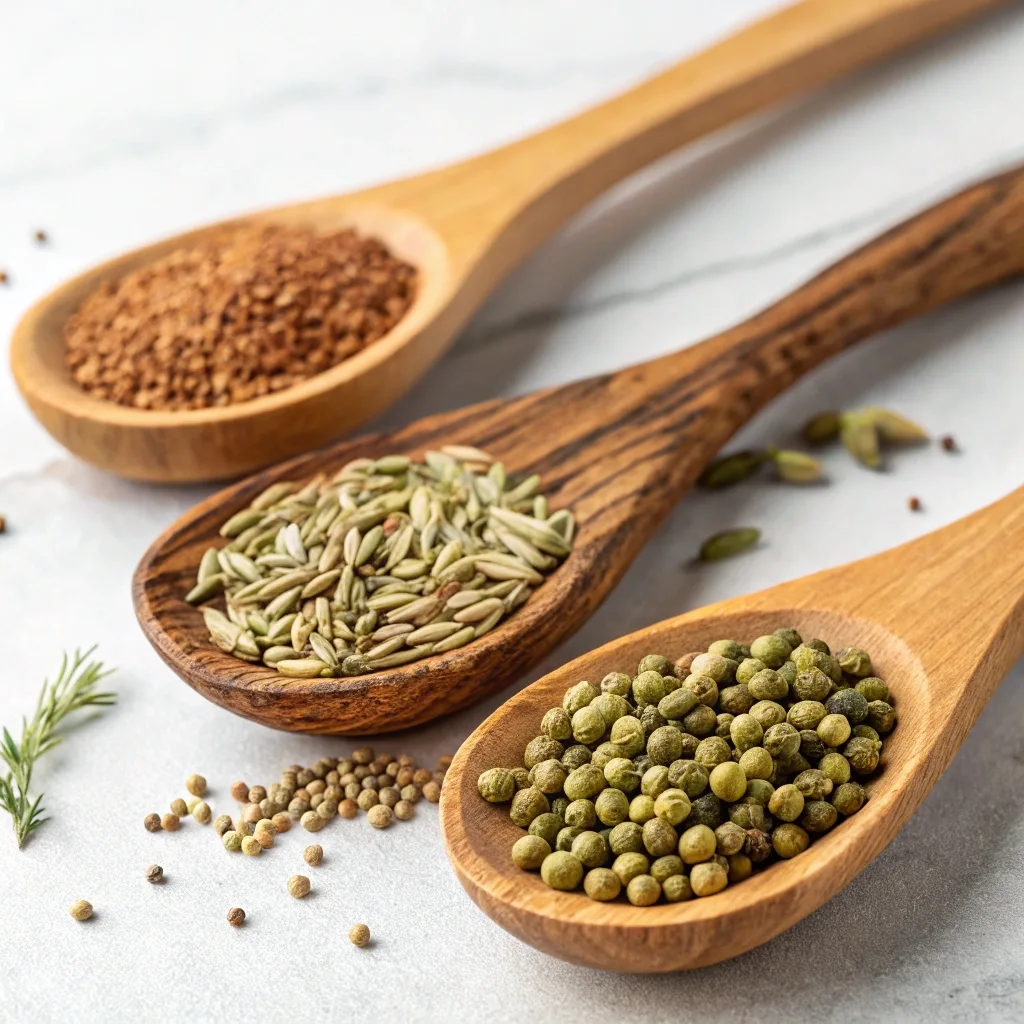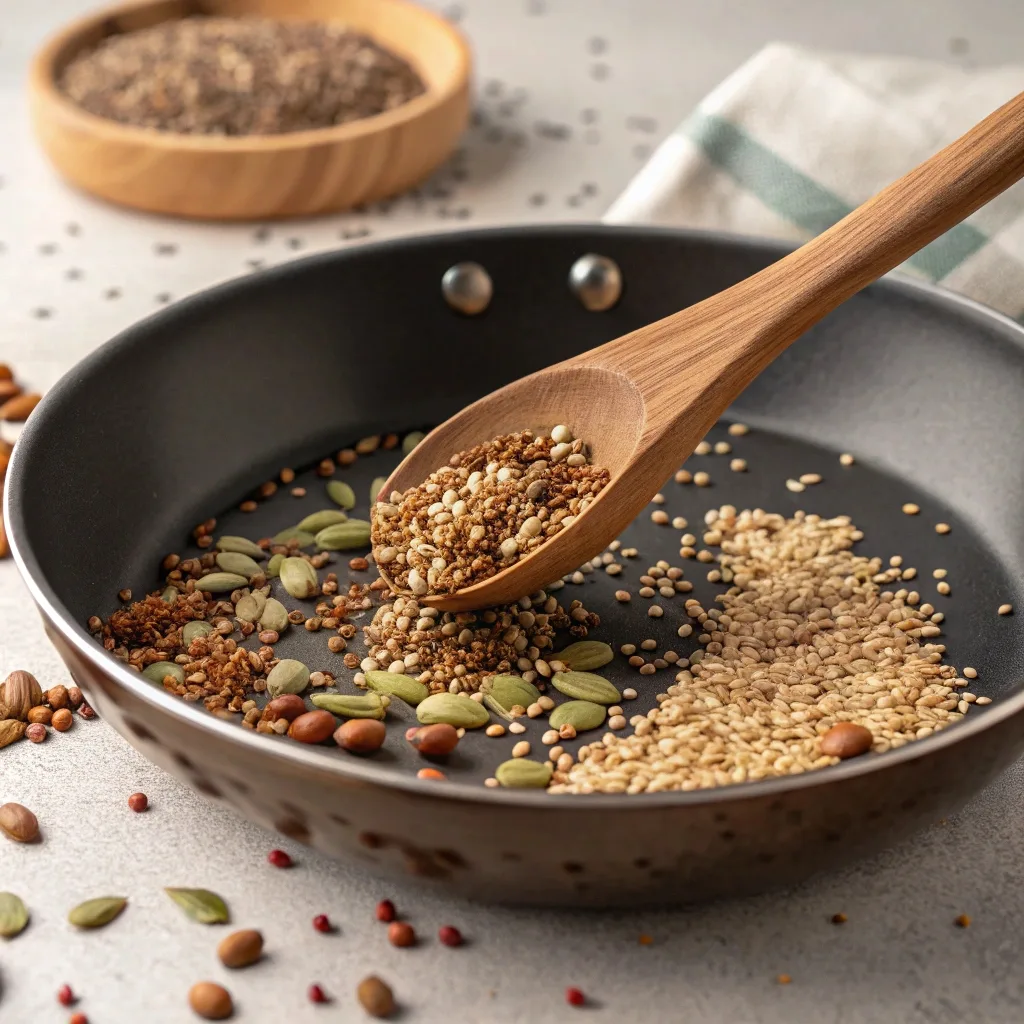If you enjoy warm, herbal drinks rooted in traditional kitchen practices, you may have come across bariatric seed tea—a simple blend made with cumin, coriander, and fennel seeds. This tea has gained attention online for its gentle flavor and its place in routines that emphasize mindful eating and comfort after meals.
Often enjoyed as a warm, soothing beverage, this seed-based tea is commonly used in many cultures as part of everyday food traditions. Rather than acting as a treatment or therapy, it’s appreciated for its simplicity and how easily it fits into balanced, food-first habits.
In this article, we’ll explore what bariatric seed tea is, how it’s traditionally prepared, and why it has become popular in wellness conversations. The focus is on understanding the recipe itself and how a drink like this can be enjoyed as part of a flexible, routine-based approach without promises or medical claims.
Table of Contents
Bariatric Seed Tea Recipe: A Soothing Gut-Healing Drink You Need to Try
The Story & Healing Origins of Bariatric Seed Tea
A family tradition turned wellness essential
The first time I heard about a seed-based tea like this wasn’t from a professional source it was from my grandmother. After heavier meals, she would quietly brew a small pot using cumin, coriander, and fennel seeds. The kitchen would fill with a warm, earthy aroma, and the ritual itself felt calming and grounding.
Years later, I noticed the same blend appearing again in modern wellness conversations, appreciated for its simplicity and long-standing place in traditional kitchens. What was once a familiar household drink has found new relevance among people who enjoy gentle, food-based routines centered on comfort and balance.
There’s something reassuring about returning to recipes that have been passed down through generations. Preparing this tea feels less about results and more about slowing down and reconnecting with simple habits. Even for those without any specific dietary focus, it can be enjoyed as a warm, everyday beverage that fits naturally alongside other wholesome recipes.
If you’ve explored our other food-first dishes like yogurt-based dips or simple breakfast parfaits you’ll recognize the same philosophy here. The bariatric seed tea recipe belongs in a kitchen that values tradition, flavor, and ease, built around ingredients that feel familiar rather than complicated.
Why bariatric patients trust this brew
After major lifestyle or dietary changes, many people become more mindful about what they eat and drink. Simple, gentle beverages often feel more appealing during these periods, especially those made with familiar, kitchen-staple ingredients.
The combination of cumin, coriander, and fennel is traditionally valued for its mild flavor and comforting aroma. Because it contains no caffeine or artificial additives, this seed-based tea is often chosen by people who prefer lighter, food-first options that feel easy to enjoy throughout the day.
Rather than acting as a treatment or solution, this tea fits naturally into routines centered on simplicity and comfort. Its appeal lies in how uncomplicated it is—just whole seeds steeped in hot water making it an approachable choice for anyone looking to incorporate warm, traditional drinks into their daily habits.
Many start drinking this tea one week post-op and continue it daily for months. It helps hydrate, fight water retention, and reset the gut microbiome. Curious how it compares to turmeric drinks or bone broths? While those are great, the simplicity and purity of this recipe make it a standout. For more bariatric-friendly ideas, check out our cauliflower cheese mash and broccoli cheddar soup.
Ingredients and Health Benefits of Bariatric Seed Tea
Print
Bariatric Seed Tea Recipe – Amazing 3-Seed Gut-Healing Drink
- Total Time: 14mins
- Yield: 2 cups 1x
- Diet: Gluten Free
Description
A soothing 3-seed tea using cumin, coriander, and fennel that supports digestion, reduces bloating, and is ideal for bariatric recovery.
Ingredients
1 tsp cumin seeds
1 tsp coriander seeds
1 tsp fennel seeds
2 to 2.5 cups water
Instructions
Add cumin, coriander, and fennel seeds to a dry saucepan.
Toast on low heat for 1–2 minutes.
Add water and bring to a boil.
Simmer for 10–12 minutes.
Strain and sip warm.
Notes
Best consumed warm in the morning or after meals.
Batch brew and refrigerate for up to 3 days.
Do not add sweeteners; optional pinch of ginger or lemon is fine.
- Prep Time: 2 mins
- Cook Time: 12 mins
- Category: Drink
- Method: Stovetop
- Cuisine: Holistic
Nutrition
- Serving Size: 1 cup
- Calories: 6
- Sugar: 0g
- Sodium: 3mg
- Fat: 0g
- Saturated Fat: 0g
- Unsaturated Fat: 0g
- Trans Fat: 0g
- Carbohydrates: 1g
- Fiber: 0.5g
- Protein: 0g
- Cholesterol: 0mg
Keywords: bariatric seed tea, cumin coriander fennel tea, digestion tea
What’s in bariatric seed tea? Just three seeds with big impact
One of the most appealing things about the bariatric seed tea recipe is how easy it is to make. You only need three pantry staples: cumin seeds, coriander seeds, and fennel seeds. That’s it no specialty herbs or expensive powders.
When combined, these seeds create a warm, aromatic tea that many people enjoy for its light flavor and comforting quality. Its simplicity is a big part of its appeal, making it an easy addition to everyday routines for those who prefer gentle, traditional drinks made from familiar ingredients.
Here’s a closer look at each:
Cumin seeds:
These small, aromatic seeds are widely used in Indian and Middle Eastern cooking for their warm, earthy flavor. When lightly toasted, cumin adds depth and a savory note to drinks and dishes, which is why it’s often included in seed-based teas and spice blends.
Coriander seeds:
Coriander seeds bring a mild, citrusy freshness that balances stronger spices. Their gentle flavor makes them a popular choice in both sweet and savory recipes, helping keep blends smooth and approachable rather than overpowering.
Fennel seeds:
Naturally slightly sweet, fennel seeds are commonly enjoyed after meals in many cultures. In tea, they soften the overall flavor and add a pleasant, mellow aroma that makes the drink easy to sip.
When combined, these three seeds create a balanced blend. Lightly toasting them before steeping helps release their natural oils, resulting in a golden-hued tea with a warm, subtly sweet scent.
This tea pairs well with simple, nutrient-focused meals such as vegetable-forward egg dishes or ricotta-based bakes making it a comfortable addition to everyday eating routines centered on familiar ingredients and gentle flavors.

A Practical, Food-First Perspective
The bariatric seed tea recipe is often appreciated not just for its traditional roots, but for how simple and approachable it is. Made from familiar pantry seeds, it fits easily into routines that prioritize gentle flavors, warm drinks, and mindful eating especially during periods when people prefer lighter, uncomplicated options.
The appeal of this tea comes from its balance. The combination of cumin, coriander, and fennel creates a mellow, aromatic drink that many people find comforting after meals. Its caffeine-free nature also makes it a popular choice for those who want a warm beverage without the intensity of coffee or strong teas.
Rather than acting as a solution or treatment, this seed tea works best as part of a broader, food-first approach focused on hydration, regular meals, and familiar ingredients. Its role is simple: offering a soothing, easy-to-prepare drink that supports calm, consistent daily habits.
Drinking it warm first thing in the morning or after meals enhances its effect. Some even sip it throughout the day from a thermos.
If you’re following a low-carb or high-protein bariatric plan, you can easily pair this tea with recipes like our eggplant parmesan rounds or buffalo cauliflower bites for a complete healing combo.
How to Make Bariatric Seed Tea at Home
Simple steps, powerful results
Making bariatric seed tea is easier than brewing your morning coffee and far more soothing. You don’t need fancy gadgets or expensive ingredients. Just a small saucepan, fresh water, and three whole spices. The key is to lightly toast the seeds before boiling. This activates their essential oils and releases the healing properties.
Here’s how to make it:
| Ingredient | Amount |
|---|---|
| Cumin seeds | 1 teaspoon |
| Coriander seeds | 1 teaspoon |
| Fennel seeds | 1 teaspoon |
| Water | 2 to 2.5 cups |
Preparation Steps:



- Add all three seeds to a dry saucepan.
- Toast on low heat for 1–2 minutes, stirring constantly. Don’t let them burn.
- Add the water and bring to a gentle boil.
- Simmer for 10–12 minutes until the water reduces slightly and turns golden.
- Strain the tea into a mug or thermos and sip warm.
You can drink this tea once or twice daily. Morning on an empty stomach is best. Some people sip small amounts throughout the day to soothe digestion. If you’re in the first few weeks post-surgery, always consult your dietitian first, but many begin incorporating it after the clear-liquid stage.
Customizing your brew
Want to add a twist? Some like to include a tiny pinch of grated ginger for anti-nausea support or a drop of lemon juice for extra cleansing. Avoid sweeteners, this tea is meant to be healing and calming, not stimulating. If you’re exploring more liquid-based recipes, check out our creamy roasted red pepper soup and butternut squash broth both easy on the gut and rich in nutrients.

Making Bariatric Seed Tea Part of Your Routine
When and how often to drink it
This seed tea is best enjoyed as part of a simple, repeatable routine rather than something to overthink. Many people start with a small cup and adjust based on personal preference, focusing on comfort and enjoyment rather than specific amounts or schedules.
Because the tea is caffeine-free and mild in flavor, it can fit naturally into different parts of the day. Some enjoy it earlier as a warm start, while others prefer it later as a calming, evening drink. There’s no single “right” time the key is finding what feels most comfortable for your routine.
Like other herbal teas, this drink can be part of your overall fluid intake, especially if you enjoy rotating between warm beverages and plain water. Paying attention to timing around meals and how your body responds can help you decide when it fits best into your day.This seed tea is best enjoyed as part of a simple, repeatable routine rather than something to overthink. Many people start with a small cup and adjust based on personal preference, focusing on comfort and enjoyment rather than specific amounts or schedules.
Because the tea is caffeine-free and mild in flavor, it can fit naturally into different parts of the day. Some enjoy it earlier as a warm start, while others prefer it later as a calming, evening drink. There’s no single “right” time the key is finding what feels most comfortable for your routine.
Like other herbal teas, this drink can be part of your overall fluid intake, especially if you enjoy rotating between warm beverages and plain water. Paying attention to timing around meals and how your body responds can help you decide when it fits best into your day.
Want variety? Pair it with post-op meal ideas like our protein-packed cottage cheese salad or sip it after a gentle snack like cheddar-stuffed mushrooms.
Tips for batching, storage, and travel
Life gets busy, and having your tea ready to go can make it easier to enjoy regularly. You can batch-brew a double or triple portion and store it in the refrigerator for up to three days. When reheating, warm it gently on the stovetop rather than using a microwave, which helps preserve the tea’s aroma and flavor.
For convenience, some people like to prepare the seed blend ahead of time. Mixing cumin, coriander, and fennel seeds in equal parts and storing them in a small jar makes daily prep quick just scoop, brew, and enjoy.
This tea is also easy to take on the go. Packing a small amount of the dry seed mix allows you to prepare it wherever hot water is available, whether you’re at work, traveling, or away from home. Keeping the process simple helps the habit feel manageable even on busy days.
Looking for more healing recipes to take on the go? Our mini crustless quiches and cheese-forward bone broth are protein-packed and travel-friendly.
Making Bariatric Seed Tea Part of Your Routine
When and how often to drink it
This seed tea tends to work best when it’s treated as a simple, repeatable part of a daily routine rather than something to measure precisely. Many people start with a small amount and adjust over time based on comfort, taste, and personal preference.
Because the tea is mild and caffeine-free, it can fit naturally into different parts of the day. Some enjoy it earlier as a warm, calming start, while others prefer it later as an evening beverage. There’s no single ideal timing the goal is to find what feels easiest to maintain.
Like other herbal teas, it can be included as part of your regular fluid intake if you enjoy rotating between warm drinks and water. Paying attention to how it fits around meals and daily habits can help you decide when it works best for you.
Want variety? Pair it with post-op meal ideas like our protein-packed cottage cheese salad or sip it after a gentle snack like cheddar-stuffed mushrooms.
Tips for batching, storage, and travel
Life gets busy, and having your tea ready to go can make it easier to enjoy regularly. You can batch-brew a double or triple portion and store it in the fridge for up to three days. When reheating, warm it gently on the stovetop rather than microwaving, which helps preserve the tea’s aroma and flavor.
For sipping throughout the day, a glass thermos works well, though stainless steel bottles are also fine for shorter storage. Keeping preparation simple makes the habit easier to maintain.
A popular time-saving tip is to pre-mix the seeds ahead of time. Combine cumin, coriander, and fennel seeds in equal parts and store them in a small jar. That way, each time you want to brew a cup, you can simply scoop and steep.
This tea also travels well. Packing a small amount of the dry seed mix makes it easy to prepare wherever hot water is available—whether you’re at work, on vacation, or on the go.
If you enjoy portable, food-first ideas, you might also like other easy-to-pack options such as mini crustless quiches or protein-rich, cheese-forward recipes that fit well into busy schedules.
FAQs About Bariatric Seed Tea Recipe
How do you make bariatric seed tea at home?
To make bariatric seed tea, combine 1 tsp each of cumin, coriander, and fennel seeds in a saucepan. Dry roast them lightly, then add 2 to 2.5 cups of water. Simmer for 10–12 minutes, strain, and sip warm. It’s gentle enough for post-op digestion and easy to make in batches.
Is seed tea good for digestion after bariatric surgery?
Yes. The cumin-coriander-fennel blend is known to support smoother digestion, reduce gas, relieve bloating, and ease acid reflux all common post-op symptoms. It’s caffeine-free, anti-inflammatory, and often recommended by bariatric dietitians as a daily soothing tea.
When should I drink bariatric seed tea?
The best time is in the morning on an empty stomach, or after your main meal to support digestion. Some people sip it throughout the day, especially if dealing with gas, nausea, or poor appetite. Always follow your surgeon or dietitian’s guidance if you’re early post-op.
Can I sweeten bariatric seed tea?
It’s best to avoid sweeteners—especially artificial or high-sugar ones. The tea has a naturally mild, slightly sweet taste from fennel. If needed, add a tiny slice of ginger or a drop of lemon for flavor, but keep it clean to preserve its digestive benefits.
Conclusion
The bariatric seed tea recipe is a reminder that simple traditions can still have a meaningful place in modern routines. With just three familiar seeds and a few quiet minutes, you can brew a warm, aromatic tea that feels comforting and easy to return to.
Rather than focusing on outcomes or labels, this tea fits best as a calming ritual one that many people enjoy after meals or during moments when they want something gentle and grounding. Its appeal lies in its simplicity, familiarity, and ease of preparation.
Whether you’re exploring traditional seed teas, building more mindful food habits, or simply looking for a warm drink to enjoy during the day, this recipe offers a small, approachable way to slow down and reconnect with simple kitchen practices. Sometimes, the most sustainable habits are the ones that feel calm, familiar, and easy to keep.

